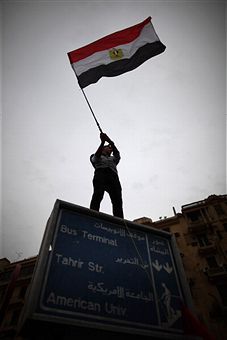 I’m back in Cairo to find out where the revolution of 25 January has got to. Nearly six
months after Hosni Mubarak’s downfall, the transition from authoritarianism is well under way.
I’m back in Cairo to find out where the revolution of 25 January has got to. Nearly six
months after Hosni Mubarak’s downfall, the transition from authoritarianism is well under way.
There is one immediate difference from my last visit: the absence of army check-points. Police officers in new white suits stand on street corners but the heavy military presence from before has gone. The Cairo police, who were absent after the revolution, have returned in new white uniforms.
However, the military – or SCAF, as it styles itself – is very much still in charge, dictating how the democratic process will continue. I remain of the view I articulated in a pamphlet a few weeks ago – that the military want to get back to the barracks, keep their substantial economic privileges and let civilians take the blame for difficult decisions. But the longer they stay in power the more they may get used to it. The Free Officers’ coup in 1952 was only meant to lead to a temporary rule by the Egyptian military; in the end it went on until 2011.
In response to the military’s rule, Tahrir Square has seen a new lease of life. People are now on the square non-stop, gathering in smaller groupings to press their concerns. Indeed, people are meeting across the town to discuss various issues. I attended a remarkable meeting of Salafists and feminists discussing the role of women in Egyptian politics. There was not, as you’d expect, much agreement: but the fact that the discussion took place at all is a sign of progress.
I’m increasingly convinced, however, that the military’s decision to hold parliamentary elections first and presidential elections afterwards will be very detrimental to Egypt’s transition and must be reversed. Egypt needs a figure like Romania’s first post-Communist president Ion Iliescu, who can help to create popular unity for a process of democratic consolidation and oversee the writing of a new constitution. A president could also create a genuine government of unity, drawing in people who have been reluctant to serve in the past. If the president promised to stand only one term so much the better. And a new constitution could still move to a parliamentary system of government, which may be better for a country tired of one-man rule.
Going for parliamentary elections first will probably mean more power for the Muslim Brotherhood and less influence for Egypt’s liberal-minded parties. They would have a greater say on the future of the constitution – again to the detriment of national unity. And they would probably end up serving not only in parliament, but in the government.
Were the military to announce a U-turn and swap the electoral timetable, the Muslim Brotherhood would probably mobilise against the change. But it might be a more winnable fight than allowing them to control the future legislature. For these reasons, Foreign Secretary William Hague should press the Egyptian military to backtrack and try to get Saudi Arabia, Turkey and the United States to do the same.






Comments